The difference between almond oil and sweet almond oil is that almond oil is the generic term for all types of oils made from almonds of both types, bitter and sweet. Sweet almond oil, on the other hand is a type of almond oil made from sweet almonds only.
However, the term ‘almond oil’ is often used to refer to sweet almond oil which is the more popular and versatile variety. It is common to find almond oil used in food recipes and skin care products. It is important to keep in mind that ‘almond oil’ will more often than not refer to sweet almond oil.
In fact, many are even ignorant of the fact that almond oil indeed also includes the bitter variety which has limited uses due to its toxicity. It is important to understand the difference between the two and avoid mistaking one for the other.
What is almond oil?
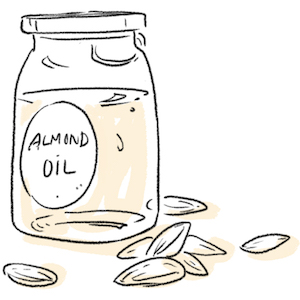 Almond oil is an extract from the edible seeds – almonds – of the Prunus dulcis tree. This tree originates from Southwest Asia and the Middle East reaching as far as the Indus River of Pakistan. Despite being considered as a nut, almond is actually a drupe. It is a seed contained in a shell that has a layer of flesh surrounding it. People eat it whole, grind it into flour, take it as non-dairy milk, and even use its oil. The food and cosmetic industry also make use of almonds and the almond oil.
Almond oil is an extract from the edible seeds – almonds – of the Prunus dulcis tree. This tree originates from Southwest Asia and the Middle East reaching as far as the Indus River of Pakistan. Despite being considered as a nut, almond is actually a drupe. It is a seed contained in a shell that has a layer of flesh surrounding it. People eat it whole, grind it into flour, take it as non-dairy milk, and even use its oil. The food and cosmetic industry also make use of almonds and the almond oil.
Almond oil, extracted from almonds, has many health benefits. It is a significant component used in skincare and haircare products. It even has medicinal properties, which make it a popular oil in Ayurveda – a field of alternative medicine. There are several rather unconventional uses of almond oil as well. According to research, almond oil can prove to be an alternative, renewable biofuel source. Evidence has it that it can prevent diabetes and cancer as well. Furthermore, it is beneficial for pets too.
Almond oil is known for its versatility. It is a significant component in skincare and haircare products. It also has a major use in aromatherapy. Read on to learn more about almond oil, its types, how it is made and its many benefits and uses.
Types of almond oil
Almonds are rich in fat and thus a great source of oil. There are two types of almonds: sweet almonds (the most commonly consumed form) and bitter almonds.
Sweet almond oil:
This oil is extracted from sweet almonds produced by the tree – prunus dulcis, var. amygdalus. The flowers of this tree are mostly white and somewhat the only feature to mark the difference from the bitter almond tree. Sweet almond oil is commonly used in home remedies and cosmetics.
Sweet almonds are nutritious, edible, and consumable with milk and food items. They have numerous benefits for health as well as skin and hair. They also contain vitamin E and omega-6 fatty acids, which are significant components of cosmetics.
Same as its source, the sweet almond oil is also edible and beneficial for health, skin, and hair. It is a carrier or base oil that comes from the fatty portion of the almond plant, i.e., kernels, nuts, and seeds. Sweet almond oil does not evaporate or disseminate its aroma as strongly as the essential oil does, and comes handy when diluting essential oils.

Bitter almond oil:
Bitter almond oil is extracted from bitter almonds produced by the tree – prunus dulcis, var. amara. The flowers of this tree are usually pink. Bitter almonds are relatively shorter and broader than sweet almonds. They can even be toxic if not duly processed. Moreover, bitter almonds contain only around 50 percent of the carrier/fixed oil present in sweet almonds.
Bitter almond oil is an essential oil that is highly potent and always used in low quantities. It easily evaporates and contains a concentrated aroma. Also, this oil is not suitable for skin care.
Bitter almond oil has glycoside amygdalin which releases highly toxic chemicals like prussic acid and benzaldehyde. Both of these chemicals are neither suitable for consumption nor for direct application. The bitter almond oil is, however, used in medicines for having anti-carcinogenic, bactericidal, and for its scent in aromatherapy.
How to distinguish between sweet and bitter almond oil?
There’s one major difference in bitter vs sweet almond oil – bitter almond oil is an essential oil whereas sweet almond oil is a fixed oil. They have different uses and their chemical natures are different too.
It is possible to distinguish between the two kinds of oil. Sweet almond oil comes in large plastic bottles of at least 60 ml (2 oz.) It is not potent and is, therefore, used for multiple purposes, e.g., as a salad dressing, as a skincare product, and so on. As for the bitter almond oil, it eats into plastic and evaporates instantly when exposed to light. Therefore, this oil comes in 10 ml (0.35 oz.) dark glass bottle.
Virgin, refined, unrefined almond oil
In order to extract oil, the plant source needs processing either mechanically or with chemicals and heat. This difference in the extraction methods renders an oil as superior or inferior in terms of quality and beget the demarcation like virgin, refined, organic, and so on. Just like other oils, almond oil comes from either solvent extraction or from the use of pressing system.

Refined almond oil
The solvent extraction uses chemical products and high temperatures. This method provides the highest industrial yield. However, it reduces the quality of oil owing to the inclusion of undesirable flavours and the inactivation of vitamins and active substances existing in the raw oil.
The oil extracted from this method is refined almond oil. One can also get refined almond oil from the pressing method, but it then undergoes purification via distillation or filtration. Oil that has gone through purification loses its natural flavour and scent.
Virgin almond oil
As for virgin almond oil, it comes from methods of pressing. Most common extraction method to obtain virgin almond oil is the cold pressing system. This is the unrefined almond oil and is also known as ‘virgin’ or ‘extra virgin.’ These terms represent the graded designation of the oil as per the industry standards. The extra virgin oil is the highest grade and has to meet multiple chemical parameters and sensory standards. A manufacturer can only tab their product as ‘virgin’ or ‘extra virgin’ when they have documented the entire process from extraction to packaging.
Organic almond oil
There is one more term one may come across in the supermarket. That is organic almond oil and is named so because its manufacturer has obtained the certification from an authority. The certification proves that the plant source has not been sprayed and the final product has not been exposed to any chemical reaction.

Why are almonds poisonous?
The bitter variant of almonds contains a toxic substance that releases hydrogen cyanide and is, thus, highly poisonous in raw form. It is for this reason that not every almond tree in the woods is safe to pluck the fruit. It only takes 100-200 mg of hydrogen cyanide to result in the consumer’s death within a few minutes. One raw bitter almond produces around 4-9 mg of hydrogen cyanide when mobilized.
It means a handful of raw bitter almonds are enough to kill a person quite swiftly. Moreover, consuming lesser amount of bitter almonds can cause severe health issues like kidney failure.
It is for the safety reasons that many countries including the US have banned the sale of raw bitter almonds, although bitter almonds are safe to use once they’ve been processed. Hydrogen cyanide is leached out via heating or baking in the processing. Regardless, a person should abstain from consuming bitter almonds.
Bitter almonds are relatively smaller and pointed than the sweet ones. Otherwise, they look same in appearance and one cannot easily distinguish between the two almond variants.
As for those almonds available at the grocery store, they are usually sweet almonds and do not contain much amount of cyanide. Same is the case with sweet almond oil. It is the regular almond oil shelved in the supermarket, safe to consume and apply.
Bitter almond oil, although not easily available in all stores, must not be used without expert advice and must never be applied directly.
Extraction methods of almond oil
The almond oil comes from two methods: solvent extraction and the use of pressing. Both methods have their pros and cons.
Solvent extraction
 This method uses chemical products and high temperatures to extract oil from almonds. It gives the highest industrial yield but compromises the quality of the oil. Furthermore, it necessitates the refining of the oil, as it induces the appearance of undesirable active substances in the raw material.
This method uses chemical products and high temperatures to extract oil from almonds. It gives the highest industrial yield but compromises the quality of the oil. Furthermore, it necessitates the refining of the oil, as it induces the appearance of undesirable active substances in the raw material.
Extraction through pressure
 This method involves both hydraulic and screw presses. The hydraulic press allows for a better retention of the oil’s physiochemical and sensorial properties, which makes it of a superior quality. However, the downside of this method is that it offers lower profitability for being labor-intensive.
This method involves both hydraulic and screw presses. The hydraulic press allows for a better retention of the oil’s physiochemical and sensorial properties, which makes it of a superior quality. However, the downside of this method is that it offers lower profitability for being labor-intensive.
Currently, the screw press, also known as the cold pressing system, is the most prevalent extraction method. Despite the name ‘cold pressing,’ it requires preheating to give better results in terms of volumes. However, this preheating impacts the quality of the oil obtained.
Extracting almond oil at home
Making almond oil at home is quite easy and cost-effective. Here are a few simple steps to extract almond oil at home without using an oil press.
Take almonds that are fresh and dry. Put them in a clean blender. Turn it on while keeping the speed low at first. After a few seconds, the almonds will start forming a ball. They will also be piling up on the sides of the blender at this time. Stop the blender, scrape off the build-up, and start blending again. Repeat this process for multiple times till the almonds turn mushy.
Now, turn the blender to a medium or higher speed. When the almonds have become a creamy, rich paste, add a teaspoon of olive oil and start blending again.
After a few minutes, take the material out and put it in a glass jar or tupperware. Keep it at room temperature for around two weeks. After the said period, the oil will automatically separate from the batter. Drip the oil in a separate container while using a strainer. That is the homemade almond oil one can use for skincare or even aromatherapy.
Composition of sweet almond oil
What is sweet almond oil made of?
Sweet almond oil is chemically comprised of fatty acids, phytosterols and tocopherols. Oleic acid or omega-9, a monounsaturated fatty acid is the main constituent (65-75%). Other fatty acids include linoleic acid (13-25%) and saturated fats like palmitic and stearic acid (8-10%). The sterol composition primarily includes β-sitosterol (75-85%) with an abundance of α-tocopherol (vitamin E).

Monounsaturated oleic acid:
A number of studies have indicated that oleic acid lowers the Low-Density-Lipoprotein (LDL) cholesterol, also known as ‘the bad cholesterol.’ Higher LDL levels increase the risk of heart diseases, whereas reducing these levels lowers this risk eventually. Monounsaturated oleic acid also reduces blood pressure, improves insulin sensitivity, and prevents obesity. It strengthens the immune system while helping resolve inflammation. It even protects against heart disease according to the famous ‘seven countries study. According to this study, people having diets rich in monounsaturated oleic acid had low rates of heart diseases.
Linoleic acid:
It burns fat and build muscle mass. Linoleic acid boosts the immune system and fights inflammation. It might also help prevent cancer along with lowering the risk of diabetes. It also plays a role in strengthening bones and protecting them.
Saturated fat:
Despite the popularly held bad opinion about saturated fat, that it increases the levels of ‘bad cholesterol’, it actually lowers these levels. One fact most people miss is that saturated fat also increases the levels of ‘good cholesterol.’ Not only that, it also changes the bad cholesterol into a subtype that is not dangerous to human health at all.
Vitamin E:
Vitamin E helps prolong cell life and provide extra protection to people who are living in a certain environmental or have a specific lifestyle that impacts the cell life. It actually tackles the free radicals that damage and ultimately degenerate the body cells. Thus, it provides a longer life to cells and prevents early aging.
Vitamin E is also effective for treatment of a movement disorder ataxia. It helps support the cell function, skin health, and immune system. The vitamin also helps reduce the appearance of scars, moisturize the skin, and act as antioxidant.
Health benefits of sweet almond oil
Almond oil offers many health benefits. Here are a few of those:
It helps with cholesterol levels
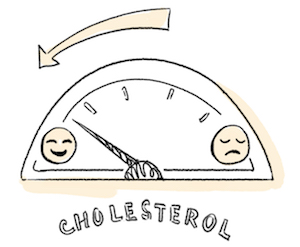 Almond oil is known to regulate cholesterol levels along with reducing triglycerides. Notably, these two factors are the major determinants of heart diseases and stroke risk.
Almond oil is known to regulate cholesterol levels along with reducing triglycerides. Notably, these two factors are the major determinants of heart diseases and stroke risk.
Almond oil is not only reduces the LDL cholesterol and the total cholesterol levels but also raises the High Density Lipoproteins (HDL) cholesterol, aka good cholesterol.
Comprising high-unsaturated fat and vitamin E, the almond oil lets the nutrients and oxygen to circulate through the blood, which implies that it is also nourishing the heart.
It can treat inflammation
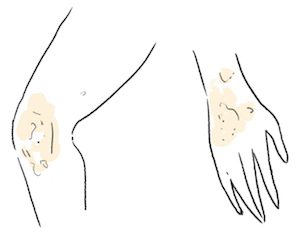 Oxidative stress is believed to be the main cause of inflammation. The almond oil protects against the oxidative stress, as it strengthens the antioxidant effects. It enables the human body to shun away free radicals and other harmful compounds. Thus, almond oil not only reduces inflammation but also slows down the aging process and reduces the risk of many health conditions like heart disease and cancer. Having anti-inflammatory properties, it also alleviates any toxic damage to the liver.
Oxidative stress is believed to be the main cause of inflammation. The almond oil protects against the oxidative stress, as it strengthens the antioxidant effects. It enables the human body to shun away free radicals and other harmful compounds. Thus, almond oil not only reduces inflammation but also slows down the aging process and reduces the risk of many health conditions like heart disease and cancer. Having anti-inflammatory properties, it also alleviates any toxic damage to the liver.
It helps lose weight
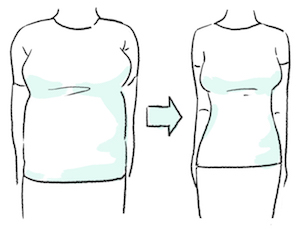 Almond oil helps shedding a few extra pounds and accelerates the weight loss process. There is ample research available that indicates people who have included almonds in their regular diets undergo greater weight loss than those who consume the same diet but without almonds.
Almond oil helps shedding a few extra pounds and accelerates the weight loss process. There is ample research available that indicates people who have included almonds in their regular diets undergo greater weight loss than those who consume the same diet but without almonds.
Generally, people are hesitant to include almond products, for their high-fat content, in their diet. But it is way better than low-fat diets, which lead to deficiencies in nutrients. Other than almonds, inducing almond oil in regular diet also ensures that a person is taking a balanced diet. Furthermore, almond oil gives a feeling of fullness that keeps one from having the mid-meal snack and a few extra calories.
It lowers the risk of heart disease and diabetes
 Along with regulating cholesterol levels, almond oil decreases the risk of developing cardiovascular diseases. Just like high cholesterol and many other ailments, heart disease is mainly caused by chronic inflammation. Therefore, foods having anti-inflammatory and anti-oxidative properties lower the risk of several prevalent health conditions like coronary heart disease.
Along with regulating cholesterol levels, almond oil decreases the risk of developing cardiovascular diseases. Just like high cholesterol and many other ailments, heart disease is mainly caused by chronic inflammation. Therefore, foods having anti-inflammatory and anti-oxidative properties lower the risk of several prevalent health conditions like coronary heart disease.
Almond oil also protects against diabetes by regulating the blood sugar levels. According to the research, taking almonds at breakfast keeps blood sugar levels controlled and increase satiety.
Increased satiety means people suffering from diabetes or prediabetes will no longer have to indulge in mid-meal snacks that is the typical case with these conditions. In the same study, almond oil gave the same results as almonds did regarding the increased insulin production after the first meal.
It helps maintaining colon and rectum health
 Almond oil proves to be very effective when it comes to rectal health. According to one study, consuming almonds lowers the risk of colon cancer. Another study indicates that the almond oil injection is the first method to treat the rectal prolapse in kids (rectal prolapse: a condition in which lower part of large intestine drops down towards or protrudes from the rectum).
Almond oil proves to be very effective when it comes to rectal health. According to one study, consuming almonds lowers the risk of colon cancer. Another study indicates that the almond oil injection is the first method to treat the rectal prolapse in kids (rectal prolapse: a condition in which lower part of large intestine drops down towards or protrudes from the rectum).
Almond oil injections also help with idiopathic pruritus ani, in which the anal region keeps itching for no apparent reason and for which there is no medicinal cure. Researchers in a study gave patients with the above-mentioned symptoms almond oil injections, which resulted in a 93 percent cure rate.
It treats ear aches
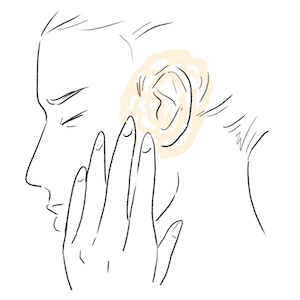 Earaches are very common, especially among the children. The causes of the pain vary, but they have one effective natural remedy, and this is using sweet almond oil. The sweet almond oil is known to relief the earache instantly. It softens the ear wax and relieves the congestion in the ventinal tubes in the ear. Unlike the other ear wax softeners, sweet almond oil is safe, even in the presence of microscopic cuts. Notably, other ear wax softeners cause infection when exposed to microscopic cuts in the ear.
Earaches are very common, especially among the children. The causes of the pain vary, but they have one effective natural remedy, and this is using sweet almond oil. The sweet almond oil is known to relief the earache instantly. It softens the ear wax and relieves the congestion in the ventinal tubes in the ear. Unlike the other ear wax softeners, sweet almond oil is safe, even in the presence of microscopic cuts. Notably, other ear wax softeners cause infection when exposed to microscopic cuts in the ear.
It helps prevent aging
Sweet almond oil is packed with vitamin E, which is a potent antioxidant. One tablespoon of almond oil provides 26 percent of the recommended daily use. It protects the cells from harmful substances called free radicals.
Almond oil helps prevent degeneration of cells and cognitive decline in the elderly. It is also believed to lower the risk of cancer and cardiovascular disease.
Common uses of sweet almond oil in food processing
Sweet almond oil is often used in foods processing. A few such uses are as follows:
- Used as the base for marinades
- Refined almond oil can be used for sautéing and pan-frying. However, it needs to be noted that only refined sweet almond oil can be used for cooking. The cold-pressed almond oil has a low smoke point and would degrade when cooked.
- Added in smoothies to contribute to the flavor.
- Makes for a great salad dressing. It can be used alone or added with other healthy oils to augment the taste as well as nutrition.
Sweet almond oil for skincare
Sweet almond oil brings a lot of benefits to the skin. That is the reason it is among the major components of skincare products. Here are some of its benefits regarding skincare.
Sweet almond oil makes skin smooth and flawless
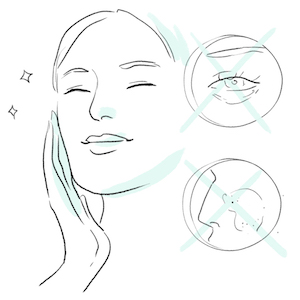 Owing to its mild hypoallergenic properties, almond oil is safe to use on sensitive skin including the baby skin. It acts as the best massage oil for infants. It is also readily absorbable into the skin, which is why it is suitable for bath application as well. Moreover, the Vitamin E component in almond oil protects the skin from oxidative damage, protects it from UV radiation, and renders it soft and supple.
Owing to its mild hypoallergenic properties, almond oil is safe to use on sensitive skin including the baby skin. It acts as the best massage oil for infants. It is also readily absorbable into the skin, which is why it is suitable for bath application as well. Moreover, the Vitamin E component in almond oil protects the skin from oxidative damage, protects it from UV radiation, and renders it soft and supple.
Sweet almond oil removes dark circle and tan
Frequent sun exposure sometimes inflames the skin, leaving it red and painful. Apply almond oil to alleviate this condition. The oil lightens the undesired tan and red patches on the skin secondary to sun exposure. Moreover, almond oil also remove bags and dark circles under the eyes.
Sweet almond oil relieves eczema and psoriasis
Eczema marks a long-term condition affecting the skin. It occurs as a result of a hypersensitivity reaction, causing the skin to overreact to certain triggers like fabrics, dyes, soaps, and other irritants. It renders the skin red, peeling, cracked, inflamed, pus-filled, or blistered. Psoriasis, on the other hand, appears as a thick patch of white scales on the skin. It is a chronic autoimmune condition that causes the overproduction of skin cells. The skin becomes red and inflamed, causing severe itching.
Both these conditions leave the skin itchy and dry. Moreover, they pave the way for other bacterial and infections as they render the skin broken. Applying almond oil on the skin keeps it hydrated, which reduces itching.
How to use sweet almond oil to treat sensitive skin
BLACK PAINT developed the following skincare regime with almond oil as a main ingredient to treat sensitive skin resulting from eczema and psoriasis.
After applying Vegetable Oil, proceed directly to cleansing with the help Chamomile Soap. It is a facial cleanser specifically designed for sensitive skin. As the name suggests, it contains chamomile oil that soothes the skin. It also contains almond oil, which hydrates the skin and has hypoallergenic properties. The oil is readily absorbable and thus helps the product penetrate the skin.
Use the soap after soaking it in warm water till the soap’s surface melts. Apply directly on the face like painting, but avoid the eye area. Massage for 30-40 seconds and rinse. Let the soap dry in a cool place with no heat and humidity.
Rose Water is a skin toner made from natural ingredients. It should be used after cleansing. This toner helps restore skin’s moisturizing factor (NMF) and keeps the skin hydrated. It has astringent properties and thus reduces and balances sebum production.
Moreover, its antibacterial and antifungal properties make it good for irritated and sensitive skin. Take two pumps of Rose Water on your palm and apply it on the entire face. Repeat the practice 2-3 times for better results.
After applying the skin toner, moisturize your skin with Ostrich Balm. It repairs dryness and replenishes Omega-7 component of the skin. It is suitable for the skin that has lost its elasticity. Moreover, it is made of natural and skin-nourishing certified organic ingredients.
This moisturizer promotes cell growth, division, and recovery. Rich in vitamin A, F, and pro-vitamin A, it absorbs quickly and nourishes the skin’s fatty cells.
Mix a bean-sized amount of Ostrich Balm evenly with two pumps of Best Water. Massage the face while focusing on dry areas like the eye and mouth.
Now that you are done with nourishing your skin, you need to protect it from the external environment. Ultraviolet (UV) rays are detrimental to your skin health and a cause for many of the common skin-related issues.
Protect your skin with Water UV Cream, which is a natural sunscreen that protects against UV rays. It contains sweet almond oil that keeps the skin cells healthy, makes it look smooth, and protects it from UV radiation damage. Not only that the aloil protects the skin from UV rays, but it also reverses the damage caused by them.
Because of its almond oil content, Water UV Cream can effectively protect your skin against the UV rays. Take a bean-sized amount of the product. Apply it in dots on five areas of your face and spread it evenly. You should keep in mind that the cream is white-colored and can result in your face looking extra white if applied in excessive quantity.
For moisture retention, you should use Water Cream. It is a water-based moisturizing cream that protects your skin from dryness and keeps it moisturized throughout the day. Its almond oil content replenishes the skin’s natural oils and protects the skin from damage.
The product is made up of seven different types of flower oil and polymeric silicon to create a protective shell against external threats. On note, do not massage this product. Spread it evenly across your face in a smooth layer.
Sweet almond oil alleviates aging signs
 Premature aging results from tobacco smoke, dehydration, and frequent sun exposure. Almond oil contains Vitamin E, a group of many potent antioxidants that treat the signs of premature aging.
Premature aging results from tobacco smoke, dehydration, and frequent sun exposure. Almond oil contains Vitamin E, a group of many potent antioxidants that treat the signs of premature aging.
How to use sweet almond oil to alleviate aging signs
BLACK PAINT provides these sweet almond oil products that help you form an anti-aging regimen. Here is how to use them in a sequence:
For cleansing, use Koicha Tea Soap. This facial soap is specifically manufactured to tackle the concerns of anti-aging. The soap reduces the appearance of aging signs like pigmentation, wrinkles, and fine lines, etc. Its almond oil content helps fade the aging marks on the skin and also keeps the skin hydrated.
Soak the soap in warm water until its surface melts. Apply directly on the face like painting. Massage your face for 30-40 seconds and rinse off.
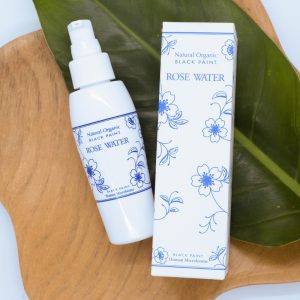 Step 2: Rose Water
Step 2: Rose Water
Rose Water is a toner containing 100 percent Bulgarian Damask Roses. It prevents moisture loss by replenishing the skin’s NMF. This product is very helpful in tightening the skin and mitigating the appearance of wrinkles. It also regulates the oil discharge, thus preventing adult acne. Apply it after using Koicha Tea Soap.
You can use Best Water after Rose Water. This toner minimizes pores along with replenishing the skin’s NMF. It restores the skin’s elasticity, which diminishes when the skin starts aging. It also allows the pores to shrink naturally.
As for its usage, apply the product on your palms first and then press on your entire face. Use it two to three times for hydration.
Use German Blue to nourish your skin. Use this facial serum after skin toning, preferably together with Best Water. It targets the skin-aging concerns by keeping the skin nourished and moisturized. The almond oil present in this product helps reduce the appearance of aging signs.
Apply two drops of German Blue with two pumps of Best Water by massaging it on the face. You can apply the product alone, but mixing it with the said toner increases absorption.
Argan Balm is a rich moisturizing balm that targets the dry skin, especially around the eye area. It contains organic Moroccan Golden Argan Oil, which retains the skin’s moisture. The balm also tackles the small wrinkles and many aging symptoms.
Mix a bean-sized amount of this balm with two pumps of Best Water. Massage directly on your face, focusing on the affected areas. Apply it after you wash your face around noon or in the evening.
 Step 6: Water UV Cream
Step 6: Water UV Cream
Water UV Cream provides your skin a protection against sun damage secondary to UV rays. This product is a good option because it contains completely natural ingredients. Moreover, its almond oil content not only provides protection against UV rays but also keeps the skin hydrated.
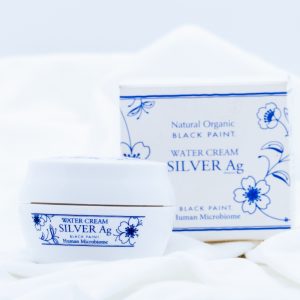 Step 7: Water Cream
Step 7: Water Cream
Water cream is a moisturizing cream that protects the skin against dryness. It contains almond oil, which keeps the skin moisturized throughout the day. On note, dryness is also one of the main reasons behind wrinkles, and using the product can prevent such happening. Apply it before going to bed.
Sweet almond oil for hair care
Sweet almond oil has many benefits for hair. Here are a few of those.
Sweet almond oil ramps up hair growth
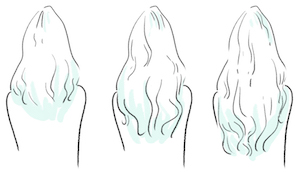 Almond oil provides nutrients to hair follicles, allowing them to grow thicker and faster. The main cause of hair loss is a deficiency in certain nutrients, which almond oil can help overcome.
Almond oil provides nutrients to hair follicles, allowing them to grow thicker and faster. The main cause of hair loss is a deficiency in certain nutrients, which almond oil can help overcome.
Take two tablespoons of sweet almond oil and two tablespoons of lemon. Mix them well and massage the scalp with this and apply the solution on the hair as well. Leave it for half an hour and then rinse off with a mild shampoo. Repeat this up to two times a week. It will help prevent the hair loss along with accelerating the growth.
Sweet almond oil helps remove dandruff
Almond oil prevents the production of fungus on the scalp, which is the main culprit behind those itchy white flakes. Furthermore, it moisturizes the scalp that enables the hair to become soft and silky.
Apply a very small amount (not more than a tablespoon) of sweet almond oil directly on the scalp. Massage the scalp and spread the oil to the hair roots. Rinse it off with a mild shampoo after thirty minutes. Doing this for just three times will shun the dandruff away.
Sweet almond oil helps reduce scalp acne
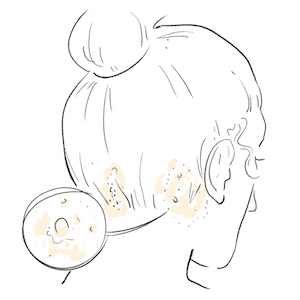 Some people suffer from scalp acne, and even when they manage to get rid of the acne on their face, those blotches remain on their scalp. Sweet almond oil kills the bacteria that cause acne and help improve the condition.
Some people suffer from scalp acne, and even when they manage to get rid of the acne on their face, those blotches remain on their scalp. Sweet almond oil kills the bacteria that cause acne and help improve the condition.
Why is almond oil a popular “base oil (carrier oil)” in essential oil?
Sweet almond oil is a mild, hypoallergenic, and readily absorbed oil. All these qualities make it a desirable carrier oil. The skin readily absorbs it, hence allowing it to effectively ‘carry’ any essential oil to the skin. Furthermore, it is lightweight and a great moisturizer, which is another reason for its popularity as a carrier oil, especially when it comes to skin care or hair care.
What is sweet almond oil’s role in soap making?
Sweet almond oil is a popular component in soap. It produces rich conditioning later and works better with an additional 5 percent to 20 percent of the total base oil. Another quality that makes this oil suitable for soap making is its quick conversion into soap when it reacts with an alkali. Filled with vitamin E, oleic acid, and linoleic acids, almond oil in soaps nourishes dry, irritated, and flaky skin. It also helps with certain skin ailments like psoriasis, eczema, and rashes.

References
https://www.researchgate.net/publication/41404356_The_uses_and_properties_of_almond_oil
http://grasasyaceites.revistas.csic.es/index.php/grasasyaceites/article/viewArticle/1609/1946
https://nutritiondata.self.com/facts/fats-and-oils/590/2
https://www.ncbi.nlm.nih.gov/pubmed/20833991
https://www.sciencedirect.com/science/article/pii/S1744388109000772?via%3Dihub
https://www.ncbi.nlm.nih.gov/pubmed/20129403
https://www.hsph.harvard.edu/nutritionsource/food-features/almonds/
https://pubs.acs.org/doi/abs/10.1021/jf2044795



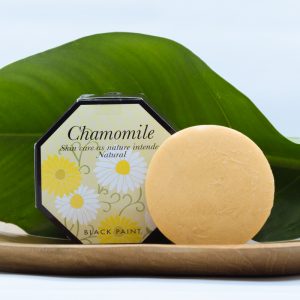 Step 1: Chamomile Soap
Step 1: Chamomile Soap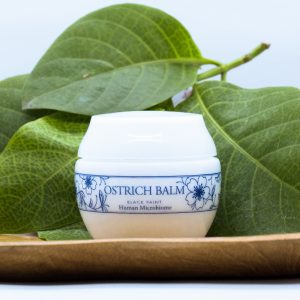 Step 3: Ostrich Balm
Step 3: Ostrich Balm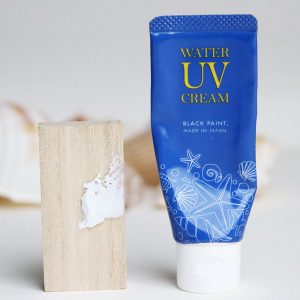 Step 4: Water UV Cream
Step 4: Water UV Cream 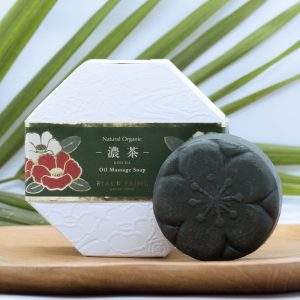 Step 1: Koicha Tea Soap
Step 1: Koicha Tea Soap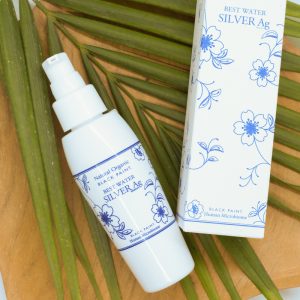 Step 3: Best Water
Step 3: Best Water 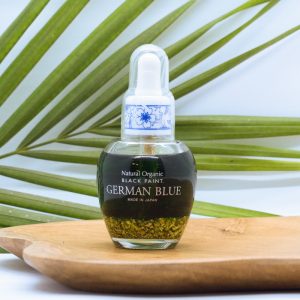 Step 4: German Blue
Step 4: German Blue 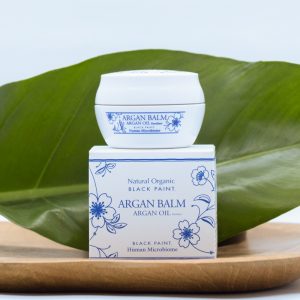 Step 5: Argan Balm
Step 5: Argan Balm 




